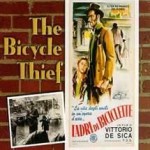All roads lead back to The Bicycle Thief, one way or another. Vittorio De Sica’s cinematic homage to daily life in post-war Italy represents the pinnacle of Neorealism – a landmark piece of cinema that still exists upon the primary plane between before and after.
The Bicycle Thief endures, in large part, as a result of its rich subtleties – the plight of a poor woman who is (quite literally) reduced to carrying water for her husband, the migrant worker whose only income goes toward paying off a fortuneteller, the honest man who needs to steal in order to keep his dreams afloat. These are timeless – perhaps even transcendent – metaphors, as broad and meaningful today as they might have been 60 years ago. Collectively, they lay the groundwork for a series of unexpected twists and turns that’ll more than likely lead viewers to question whether De Sica was really that far ahead of his time, or whether Hollywood has since taken to treating all of us like Pavlov’s dog.
The pace of The Bicycle Thief is slow, the tone is bleak. And yet, there is a buoyancy to this film that keeps the mood lighthearted throughout. Somewhere in between, De Sica manages to guide you through a stilted tour of Roman strata – the yes men, the radicals, the street merchants and socialists; the priests, the pimps, the lawyers and lawbreakers; the barbers, the artisans; the gypsies, tramps, and thieves; la pezzonovante, la famiglia, la Polizia e Mano Nera … each group fully present and accounted for. None of which is easy, given Cesare Zavattini’s screenplay was adapted from a novel largely hinged upon morality.
If Shoeshine was De Sica’s springboard, then The Bicycle Thief was his capolavoro. This film is still ranked No. 33 on Sight & Sound’s Top 50 Movies of All-Time. It’s been cited as a major influence by every director from Woody Allen to Federico Fellini. And certain sequences have even been revisited by the likes of Steven Spielberg and Bruce Springsteen (among others).
Bottom Line: The Bicycle Thief was, is, and probably always will be the charming little indie people look to in order to understand how and why every other charming little indie still needs to be made. Please do check it out. It’s even better than you know.
(The Bicycle Thief is currently streaming on both Netflix and YouTube.)

